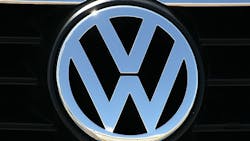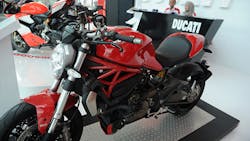VW Said to Weigh Asset Sales in End to Era of Empire Building
Volkswagen AG (IW 1000/7) is shifting away from its era of empire building with plans to bundle its fragmented components businesses and review its portfolio for possible asset sales.
To navigate the company out of the emissions-cheating scandal, the biggest crisis in its history, Chief Executive Officer Matthias Mueller is undertaking a sweeping strategy review that includes backing off a focus on growth at all costs, shifting the company into car-sharing and stepping up electric-vehicle development. The portfolio review will assess Volkswagen’s 12 brands as well as side businesses such as ship engines, while components manufacturing across the group will be folded into one entity, according to people familiar with the matter.
Mueller presented his plans to Volkswagen’s supervisory board on Tuesday and will outline the strategy to the media on Thursday. Volkswagen officials declined to comment ahead of the public presentation.
The steps make “perfect sense,” said Arndt Ellinghorst, a London-based analyst with Evercore ISI. “The financial market still doesn’t seem to realize that there is more going on at VW than some people might think.”
Volkswagen’s shares gained 2.2% to 121.70 euros at 11:08 a.m. in Frankfurt. The stock has rebounded more than 40% since hitting a post-scandal low in October.
Mueller, who took charge after the scandal erupted, is seeking to address weaknesses stemming from more than a decade of expansion that included acquiring Swedish heavy-duty truckmaker Scania, Italian motorcycle maker Ducati and German sports-car brand Porsche. The focus on growth and a rigid, centralized structure caused Volkswagen to be slow to adapt to changes and contributed to weak profits at the namesake brand, which was struggling even before the crisis hit its image.
Mueller is trying to guide the company forward after it admitted in September to cheating on emissions tests. Volkswagen, which faces a deadline to finalize a settlement in U.S. next week, has so far set aside 16.2 billion euros (US$18.2 billion) for fines and expenses to fix as many as 11 million cars worldwide.
The carmaker plans to merge the components units of each brand into one new entity that would include about 70,000 employees at more than two dozen locations worldwide, allowing it to trim spending and boost efficiency from a single management and unified strategy, said the people.
While the size of the business is difficult to estimate, Volkswagen reported 14.6 billion euros in revenue in 2015 from selling components to third parties, including Chinese joint ventures, Evercore’s Ellinghorst said.
The reorganization resembles moves by pre-bankruptcy General Motors Corp. to create Delphi and Ford Motor Co. to establish Visteon. Those U.S. auto-parts companies were later spun off. Currently, there are no plans to spin off or sell the new VW components unit, one of the people said.
VW was a pioneer more than a decade ago at pooling manufacturing resources by sharing platforms for similar cars from its different ranges, which include the namesake brand, as well as the luxury Audi marque, Czech Skoda Auto and Seat of Spain.
Portfolio Review: Expendable Assets?
VW is also likely to announce plans for a portfolio review, which could lead to the sale of non-core assets, said the people. While no decisions have been made on which assets are expendable or what the time frame might be, ones that could end up on that list include Ducati, the MAN Diesel & Turbo business and propulsion specialist MAN Renk, said the people. An initial public offering of the trucks business, which includes the Scania and MAN units, could also be considered down the road, one of the people said.
“Commercial-vehicle demand is on the rise in Europe so their timing on a sale of the truck operations MAN and Scania might be well timed,” Richard Hilgert, a Chicago-based analyst with Morningstar, said in an e-mail. “Ducati is a well-revered brand and could be worth a pretty penny.”
Disposals are particularly sensitive at Volkswagen, as both its powerful unions and second-largest shareholder, the German state of Lower Saxony, don’t like to see the company get smaller.
The expansion of Volkswagen into the broad range of product lines and brands it juggles today was the brainchild of Ferdinand Piech, the long-time CEO and later chairman of the company. Piech left last year in a management dust-up with Martin Winterkorn, Mueller’s predecessor, who followed Piech out the door shortly after the emissions scandal broke into the open. Mueller previously ran the Porsche sports-car subsidiary.
By Aaron Kirchfeld, Christoph Rauwald and Ed Hammond
About the Author
Bloomberg
Licensed content from Bloomberg, copyright 2016.

